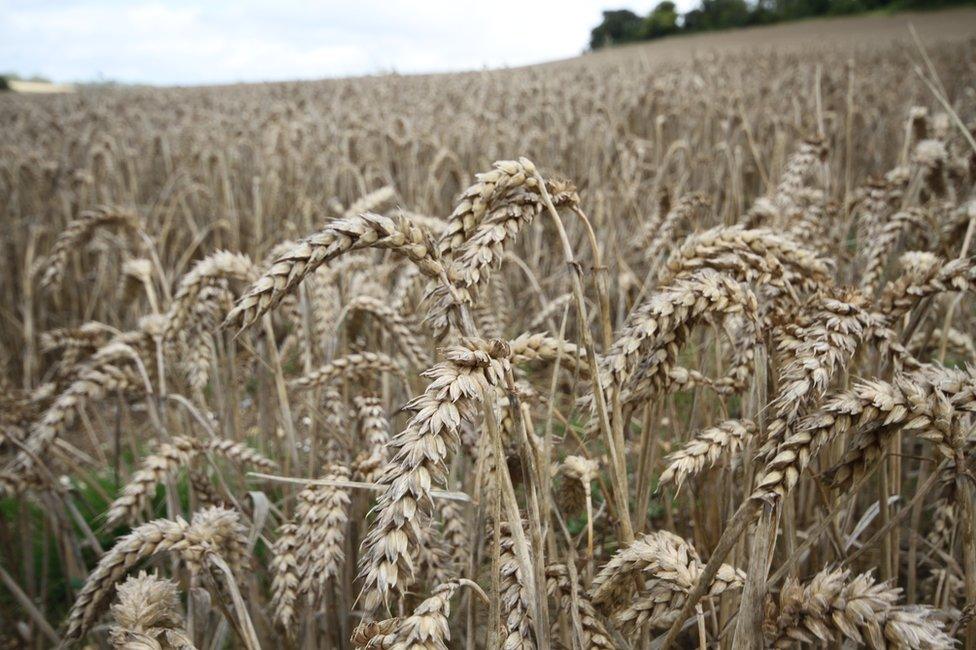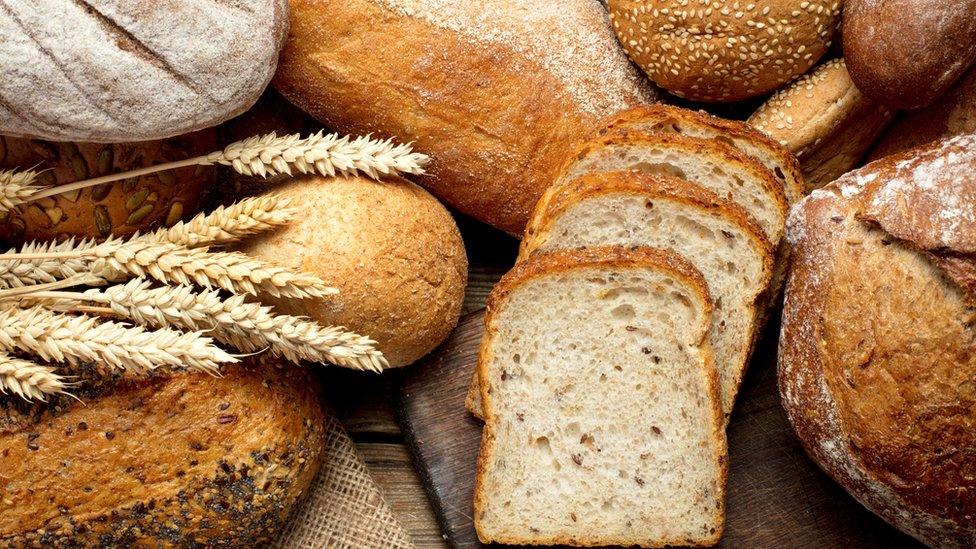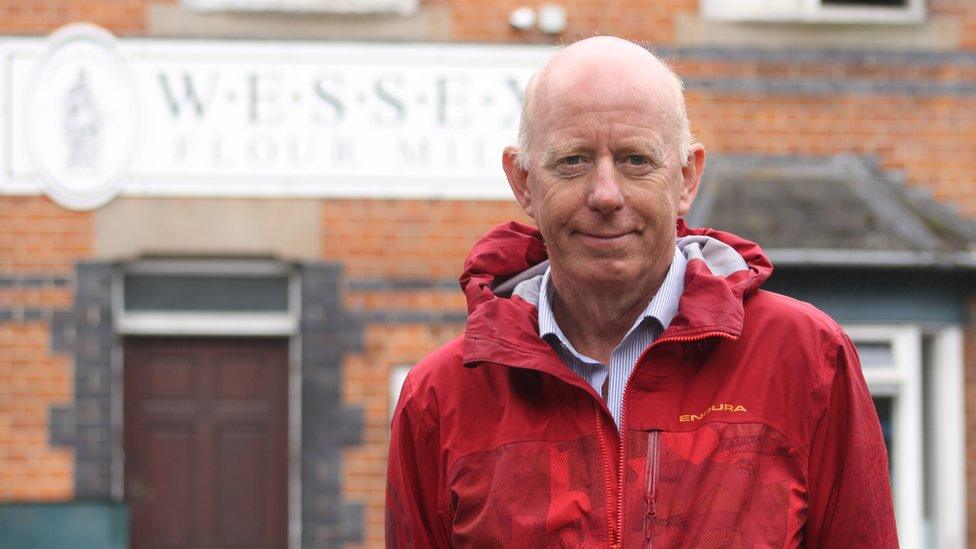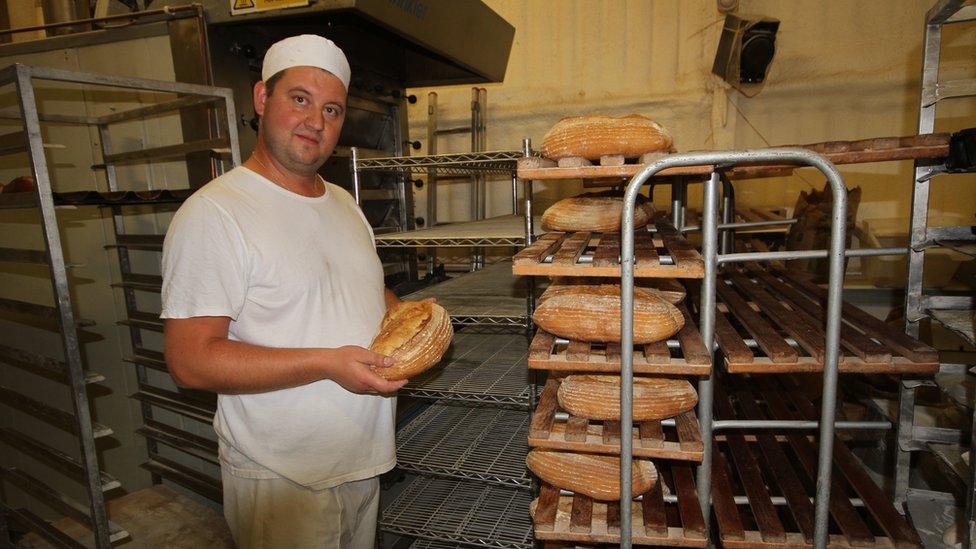Bread price may rise after dire UK wheat harvest
- Published
- comments

The price of flour and bread is set to rise after what could be the worst UK wheat harvest in 40 years, the industry is warning.
Farmers say that the extreme weather over the last year is likely to mean wheat yields are down by up to 40%.
As a result, some millers have already increased the price of flour by 10% and they warn a no-deal Brexit could push up prices even further.
And we're likely to see more of the same weather in future, experts say.
The UK Met Office told BBC News that the extremes of wet and hot conditions that have marked this year are likely to become more common as our climate continues to change.
Triple-whammy
Wheat farmers have been hit with a triple-whammy of severe weather, according to the National Farmers' Union (NFU).
First off, unusually heavy rain in the autumn meant many farmers could not plant as much wheat as they usually would. What they did plant did not thrive in the waterlogged soil.
That was followed by the wettest February on record.
Storms Ciara and Dennis battered much of the UK in the early and middle of the month, causing widespread flooding. They were followed by Storm Jorge at the end of February.
Then we had the very hot and dry spring which caused droughts in many areas of the UK, making it hard for the crop to take up nutrients from the soil.

A rise in the price of flour will be passed on to the bread we buy
Finally, the heavy rain this August meant many farmers have had to delay harvesting their crops.
"We're looking at a 30% reduction in our good fields, in some of our poor fields it's is even more", said Matt Culley, an arable farmer from Hampshire who is chair of the NFU's crop board.
Some of his grain stores are virtually empty where normally they would be full at this time of year.
He said much of the wheat that the rain has forced him to leave in the fields will only be fit for animal feed.
It is, said Mr Culley, the worst harvest in the 37 years he's been farming, with the most dramatic variation in the weather he has ever known.
Weather extremes
A spokesperson for the Met Office explained: "UK climate projections show a trend towards hotter and drier summers and warmer, wetter winters."
Since 85% of the wheat used for flour is grown here in the UK, flour millers will have to make up the shortages caused by this year's dire harvest with imports.
And, because the price of wheat has been increasing steadily since the summer, the price of flour will rise, says Alex Waugh who runs the National Association of British and Irish Millers.

Paul Munsey says further rises in the price of flour are to be expected
He says wheat prices are already up by £40 a tonne - an increase of more than 20%.
Because the margins millers operate on are very tight, they will have no choice but to pass some of this increase on to consumers by raising prices.
"It's reached the point where we can't afford to keep selling flour at the price that we are," Paul Munsey of Wessex Mill in Oxfordshire told BBC News.
He has already increased the price of his flour by 12% and warns there may be further price rises to come.
Brexit impacts
In the event of a no-deal Brexit, wheat imports could be liable for a £79 per tonne tariff, said the National Association of British and Irish Millers. This figure is derived from the World Trade Organization (WTO) standard tariff for wheat.
Wheat prices are always volatile, but this would represent a further 40% hike in wheat prices which, once again, would be likely to drive up the price of flour.
And when the price of flour rises, you can expect the price of bread to rise a little - as well as the price of biscuits, pastries and cakes.
Agata Towpik runs Marcopolo Bakery in Wantage which specialises in craft bread.

Peter Towpik runs a craft bread bakery with his wife Agata
She says she is - very reluctantly - considering raising her prices.
It will be only the second time she has done so since she and her husband Peter started the business a decade ago.
"Flour is our main ingredient and all the prices are increasing at the moment, so that will probably force us to put our prices up," she said.
"We love our customers and want as many of them as possible to be able to buy from us. But there's less money coming into the company and we've got employees and rent to pay."
Follow Justin on Twitter., external